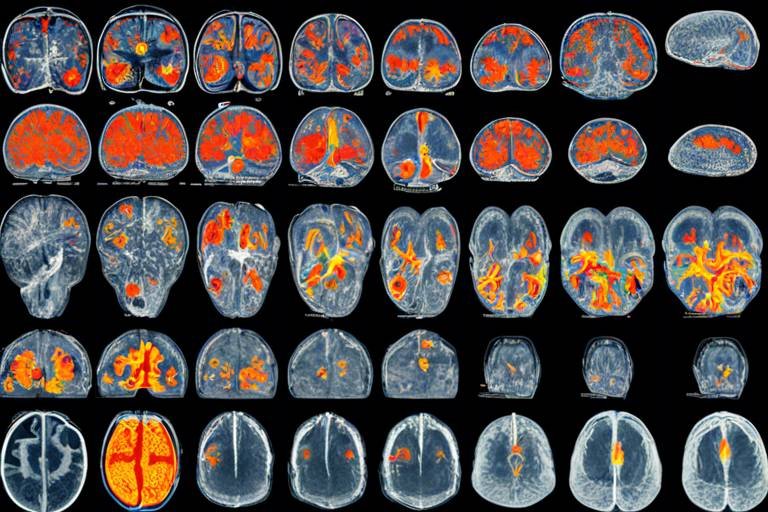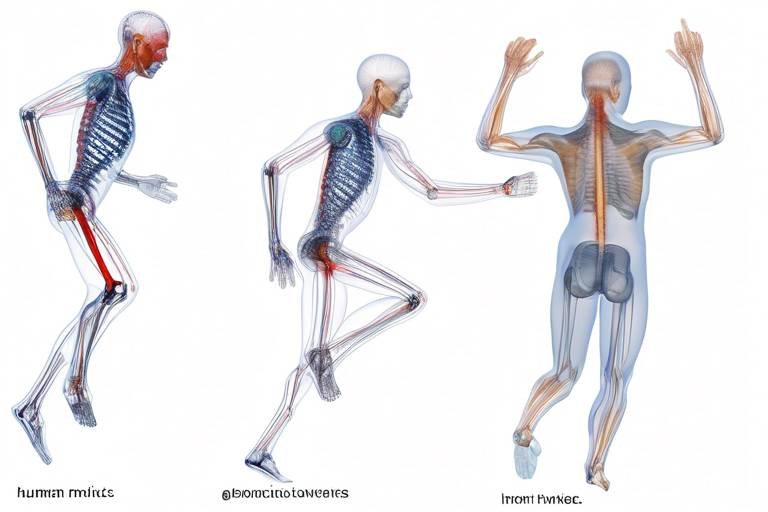The Science of Nutrition - What Recent Studies Reveal
Welcome to the fascinating world of nutrition science! In recent years, researchers have been diving deep into the intricate relationship between what we eat and our overall health. It's not just about counting calories or sticking to a diet; it's about understanding how various foods affect our bodies at a cellular level. With the explosion of new studies, we are uncovering insights that could revolutionize the way we think about food and its impact on our lives. Have you ever wondered why some diets work wonders for some people but not for others? Or how a simple change in your eating habits can lead to significant health improvements? Let’s explore these questions and more as we delve into the latest findings in nutrition science.
Macronutrients—carbohydrates, proteins, and fats—are the building blocks of our diet, and recent studies emphasize their importance in energy balance and metabolic health. Think of macronutrients as the fuel that powers our bodies. Each plays a unique role: carbohydrates provide quick energy, proteins are essential for building and repairing tissues, and fats support cell function and hormone production. Recent research has shown that the right balance of these macronutrients can influence everything from weight management to athletic performance. For instance, athletes may benefit from a higher protein intake to support muscle recovery, while those looking to lose weight might focus on reducing carbohydrate consumption. Understanding your body’s specific needs can make all the difference in achieving your health goals.
Vitamins and minerals, often referred to as micronutrients, are crucial for various bodily functions. Recent research reveals that deficiencies in these essential nutrients can lead to serious health issues. For example, a lack of vitamin D can weaken bones, while insufficient iron can result in anemia. This underscores the importance of a balanced diet rich in micronutrients. But how do we ensure we’re getting enough? Incorporating a variety of colorful fruits and vegetables into our meals is a great start. Each color often corresponds to different nutrients, so a vibrant plate is not just visually appealing but also beneficial for our health.
Antioxidants play a vital role in protecting our bodies from oxidative stress, which can lead to chronic diseases. Recent studies suggest that a diet high in antioxidant-rich foods can reduce the risk of conditions such as heart disease and cancer, promoting longevity. But what exactly are antioxidants? They are compounds found in various foods that neutralize harmful free radicals in the body. By consuming a diet rich in antioxidants, you’re essentially arming your body with the tools it needs to fight off damage.
Fruits and vegetables are primary sources of antioxidants. Research highlights the benefits of incorporating a variety of colorful produce into daily meals. For example, berries, dark leafy greens, and nuts are all excellent sources. Not only do these foods taste great, but they also provide a powerful punch of nutrients that can help keep you healthy. Think of your plate as a canvas—each color adds a unique flavor and health benefit.
The debate continues regarding the efficacy of antioxidant supplements versus whole foods. While supplements can be convenient, studies indicate that whole food sources may provide synergistic benefits that supplements cannot match. Whole foods contain a complex array of nutrients that work together, enhancing their effectiveness. So, the next time you're considering a supplement, remember that a well-rounded diet filled with whole foods might just be the better option for your health.
Emerging studies emphasize the gut microbiome’s role in nutrition and health. A diverse microbiome is linked to improved digestion, immune function, and even mental health. Think of your gut as a bustling city, with trillions of microorganisms working tirelessly to keep everything running smoothly. When this balance is disrupted, it can lead to various health issues. By consuming a diet rich in fiber, prebiotics, and probiotics, you can help maintain a healthy gut environment.
Recent research has focused on dietary patterns, such as the Mediterranean and plant-based diets, demonstrating their positive effects on cardiovascular health and chronic disease prevention. These diets are not just about what you eat; they represent a lifestyle choice that emphasizes whole, minimally processed foods. Adopting such dietary patterns can lead to significant improvements in overall health and well-being. So, if you're looking to make a change, consider how your eating habits align with these beneficial patterns.
Longitudinal studies reveal that dietary choices made over decades significantly impact health outcomes. This emphasizes the importance of sustainable eating habits for lifelong wellness. It’s not about quick fixes; it’s about making lasting changes. Imagine your diet as a long-term investment in your health—what you choose to 'spend' your calories on today will pay dividends in the future.
Advancements in personalized nutrition are transforming dietary recommendations. Studies show that individual genetic, metabolic, and lifestyle factors can inform tailored nutrition strategies for better health outcomes. This means that what works for your friend may not necessarily work for you. By understanding your body’s unique needs, you can create a nutrition plan that truly supports your health goals.
- What are macronutrients?
Macronutrients include carbohydrates, proteins, and fats, which are essential for energy and bodily functions. - Why are micronutrients important?
Micronutrients, such as vitamins and minerals, are crucial for overall health and can prevent deficiencies that lead to health issues. - How can I increase antioxidants in my diet?
Incorporate a variety of colorful fruits and vegetables, nuts, and whole grains into your meals. - Should I take supplements or focus on whole foods?
Whole foods are generally recommended as they provide a complex array of nutrients that work synergistically. - What is the gut microbiome?
The gut microbiome consists of trillions of microorganisms that play a crucial role in digestion and overall health.

The Role of Macronutrients
Macronutrients—carbohydrates, proteins, and fats—are the building blocks of our diet, playing essential roles in maintaining energy levels and supporting overall health. Recent studies have put a spotlight on their significance, revealing how these nutrients influence everything from weight management to athletic performance. Imagine your body as a complex machine; just like a car needs fuel, oil, and coolant to run smoothly, our bodies require the right balance of macronutrients to function optimally.
Carbohydrates are often misunderstood. While some diets vilify them, recent research indicates that they are a primary source of energy. They fuel our brain and muscles, making them crucial, especially for those engaging in physical activities. Complex carbohydrates, such as whole grains and legumes, are particularly beneficial as they provide a steady release of energy, preventing those dreaded sugar crashes. On the other hand, simple carbohydrates, found in sugary snacks and drinks, can lead to quick spikes in blood sugar levels, which are often followed by a rapid drop, leaving you feeling fatigued and irritable.
Next up is protein, which is often hailed as the building block of life. It plays a pivotal role in muscle repair, hormone production, and immune function. Recent studies suggest that not all proteins are created equal. Animal-based proteins (like meat, dairy, and eggs) and plant-based proteins (like beans, nuts, and tofu) both have unique benefits. For instance, animal proteins are typically complete proteins, containing all essential amino acids, while many plant proteins may lack one or more. However, combining different plant sources can provide a complete amino acid profile, making it possible to meet your protein needs without relying solely on animal products.
Lastly, we have fats, often seen as the villain in many diets. Yet, fats are crucial for absorbing vitamins, protecting organs, and providing essential fatty acids that the body cannot produce on its own. Recent research emphasizes the importance of healthy fats, such as those found in avocados, nuts, and olive oil. These fats can actually promote heart health and reduce inflammation, contrasting sharply with the negative perception surrounding all fats. It's about choosing the right types!
To illustrate the roles of these macronutrients, consider the following table:
| Macronutrient | Primary Function | Sources |
|---|---|---|
| Carbohydrates | Energy source | Whole grains, fruits, vegetables |
| Proteins | Tissue repair and growth | Meat, dairy, beans, nuts |
| Fats | Energy storage and nutrient absorption | Avocados, olive oil, fatty fish |
Understanding the roles of macronutrients is not just about knowing what to eat; it’s about recognizing how these nutrients work together to support our health. Balancing these macronutrients in your diet can lead to improved energy levels, better weight management, and enhanced overall well-being. So, the next time you plan your meals, think of your plate as a canvas where these macronutrients come together to create a masterpiece of health!

Micronutrients and Their Impact
When we think about nutrition, our minds often gravitate towards the big players—carbohydrates, proteins, and fats. However, micronutrients—the vitamins and minerals that our bodies require in smaller amounts—are equally crucial for maintaining optimal health. Recent research has illuminated the significant role these tiny powerhouses play in various bodily functions, from supporting our immune system to regulating our metabolism. Just like a well-tuned orchestra, each micronutrient contributes to the harmonious functioning of our body, and deficiencies can lead to a cacophony of health issues.
For instance, a lack of vitamin D can result in weakened bones, while insufficient iron can lead to anemia, leaving you feeling fatigued and drained. The importance of a balanced diet rich in these essential nutrients cannot be overstated. Studies indicate that many people, especially those with restrictive diets, are not meeting their micronutrient needs. This is alarming, as even mild deficiencies can have a ripple effect on our overall health.
Let's break it down a bit. Micronutrients can be classified into two categories: vitamins and minerals. Vitamins are organic compounds that are generally sensitive to heat and light, while minerals are inorganic and tend to be more stable. Here’s a quick overview of some vital micronutrients and their impacts:
| Micronutrient | Function | Sources |
|---|---|---|
| Vitamin A | Supports vision and immune function | Carrots, sweet potatoes, spinach |
| Vitamin C | Boosts immune health and aids in collagen production | Citrus fruits, bell peppers, broccoli |
| Iron | Essential for oxygen transport in the blood | Red meat, beans, lentils |
| Calcium | Crucial for bone health | Dairy products, leafy greens, fortified foods |
As you can see, each micronutrient has its own unique role to play. But here’s the kicker: our bodies don’t produce these nutrients naturally. We must obtain them through our diets or, in some cases, supplements. This is where the conversation about balanced diets comes into play. Eating a wide variety of foods ensures that we are covering our bases when it comes to micronutrient intake. Think of your plate as a palette—vibrant, colorful fruits and vegetables not only make your meal visually appealing but also pack a punch of essential vitamins and minerals.
Interestingly, recent studies have shown that the bioavailability of these micronutrients—the degree to which they are absorbed and utilized by the body—can be affected by various factors, including the presence of other nutrients. For example, vitamin C enhances iron absorption, which is why pairing iron-rich foods with vitamin C sources (like strawberries or oranges) is a smart move. This interplay among nutrients highlights the importance of not just focusing on individual vitamins and minerals but rather on how they work together in a balanced diet.
In conclusion, while macronutrients get a lot of the spotlight, we cannot overlook the vital roles that micronutrients play in our health. They are the unsung heroes of nutrition, working tirelessly behind the scenes to keep our bodies functioning optimally. As we continue to explore the fascinating world of nutrition science, it’s clear that a well-rounded diet rich in both macronutrients and micronutrients is essential for achieving and maintaining our best health.
- What are micronutrients? Micronutrients are vitamins and minerals that our bodies need in small amounts for proper functioning.
- How can I ensure I get enough micronutrients? Eating a diverse diet rich in fruits, vegetables, whole grains, lean proteins, and healthy fats can help meet your micronutrient needs.
- Are supplements necessary for micronutrients? While whole foods are the best sources of micronutrients, supplements may be necessary for individuals with specific deficiencies or dietary restrictions. Always consult a healthcare provider before starting any supplements.

The Importance of Antioxidants
Antioxidants are like the superheroes of the nutrition world, battling the villains of oxidative stress and free radicals that threaten our health. These tiny compounds play a crucial role in protecting our cells from damage, which can lead to chronic diseases like heart disease, diabetes, and even cancer. Recent studies have brought to light just how vital these antioxidants are for our overall well-being. Imagine your body as a bustling city; antioxidants are the diligent firefighters, always ready to extinguish the flames of inflammation and oxidative damage that can wreak havoc on your health.
Research has shown that a diet rich in antioxidants can significantly reduce the risk of developing chronic diseases. For instance, a study published in the Journal of Nutrition found that individuals who consumed higher amounts of antioxidant-rich foods had a lower incidence of heart disease. This correlation highlights the importance of incorporating these powerful nutrients into our daily diets. But what exactly are antioxidants, and where can we find them? Let's break it down:
| Type of Antioxidant | Sources | Health Benefits |
|---|---|---|
| Vitamin C | Citrus fruits, strawberries, bell peppers | Boosts immune function, protects skin health |
| Vitamin E | Nuts, seeds, spinach | Protects cell membranes, supports eye health |
| Beta-Carotene | Carrots, sweet potatoes, leafy greens | Supports vision, enhances immune response |
| Flavonoids | Tea, berries, dark chocolate | Reduces inflammation, improves heart health |
Incorporating a variety of colorful fruits and vegetables into your meals is one of the best ways to ensure you’re getting a wide range of these beneficial antioxidants. Think of your plate as a canvas; the more colors you add, the more vibrant and nutritious your meal becomes. Not only do these foods taste great, but they also provide a plethora of health benefits.
However, there’s an ongoing debate about whether antioxidant supplements can match the benefits of whole food sources. While supplements may offer a concentrated dose of antioxidants, studies suggest that whole foods provide synergistic benefits that supplements simply cannot replicate. Whole foods come packed with fiber, vitamins, and minerals that work together to enhance overall health. So, while popping a pill might seem convenient, it’s essential to prioritize whole food sources to reap the full spectrum of health benefits.
In conclusion, antioxidants are indispensable allies in the quest for optimal health. By making conscious choices to include a variety of antioxidant-rich foods in our diets, we can fortify our bodies against chronic diseases and promote longevity. Remember, the key is to embrace a colorful, balanced diet that nourishes not just the body but also the soul.
- What are antioxidants? Antioxidants are compounds that protect your cells from damage caused by oxidative stress and free radicals.
- How can I increase my antioxidant intake? You can increase your intake by consuming a variety of colorful fruits and vegetables, nuts, seeds, and whole grains.
- Are supplements as effective as whole foods? While supplements can provide antioxidants, whole foods offer additional nutrients and benefits that supplements may lack.
- What are some examples of antioxidant-rich foods? Examples include berries, dark chocolate, nuts, green tea, and leafy greens.

Sources of Antioxidants
When we talk about antioxidants, we're diving into a world filled with vibrant colors and delicious flavors! These powerful compounds are primarily found in fruits and vegetables, and they play a pivotal role in keeping our bodies healthy and thriving. Imagine antioxidants as tiny warriors, battling free radicals and oxidative stress that can lead to chronic diseases. So, what are some of the best sources of these nutritional superheroes?
First off, let's talk about berries. Blueberries, strawberries, and raspberries are not just tasty; they are packed with antioxidants like anthocyanins, which give them their rich colors. Studies have shown that regularly consuming berries can help reduce inflammation and improve heart health. Next up, we have dark chocolate. Yes, you heard it right! Dark chocolate is loaded with flavonoids, which are powerful antioxidants. Just remember, moderation is key—too much chocolate can lead to other issues!
Moving on, green leafy vegetables like spinach and kale are also excellent sources. They are rich in vitamins A, C, and E, all of which contribute to antioxidant activity. Additionally, don't overlook the benefits of nuts, particularly walnuts and pecans. These little powerhouses are not only packed with healthy fats but also contain high levels of antioxidants. Incorporating a variety of these foods into your daily diet can significantly enhance your antioxidant intake.
To make it easier for you, here's a quick table summarizing some top antioxidant-rich foods:
| Food | Key Antioxidants | Health Benefits |
|---|---|---|
| Berries | Anthocyanins | Reduce inflammation, improve heart health |
| Dark Chocolate | Flavonoids | Boost heart health, improve brain function |
| Green Leafy Vegetables | Vitamins A, C, E | Support immune function, promote skin health |
| Nuts | Vitamin E, flavonoids | Lower cholesterol, reduce heart disease risk |
But wait, there's more! Don't forget about spices like turmeric and cinnamon, which are not only flavorful but also rich in antioxidants. Turmeric contains curcumin, known for its anti-inflammatory properties, while cinnamon is packed with polyphenols. Adding these spices to your meals can elevate both the taste and health benefits.
In summary, incorporating a colorful array of fruits, vegetables, nuts, and spices into your diet can significantly boost your antioxidant intake. The key is variety—each food brings its unique set of antioxidants to the table, so mix it up! By doing so, you're not just eating; you're fueling your body with the nutrients it needs to fight off oxidative stress and maintain overall health.
- What are antioxidants? Antioxidants are compounds that help protect the body from oxidative stress by neutralizing free radicals.
- How can I increase my antioxidant intake? Incorporate a variety of colorful fruits and vegetables, nuts, and spices into your daily meals.
- Are antioxidant supplements effective? While supplements can help, whole foods provide additional nutrients and benefits that supplements may lack.
- Can antioxidants help prevent chronic diseases? Yes, a diet rich in antioxidants has been linked to a reduced risk of chronic diseases such as heart disease and cancer.

Supplementation vs. Whole Foods
When it comes to nourishing our bodies, the debate between supplements and whole foods often takes center stage. With the rise of health trends and the convenience of popping a pill, many people find themselves wondering: are supplements truly effective, or is it better to stick with nature's bounty? Recent studies have shed light on this ongoing discussion, revealing that while supplements can offer certain benefits, they often fall short when compared to the complex nutritional profiles found in whole foods.
Whole foods, such as fruits, vegetables, whole grains, nuts, and seeds, are packed with a variety of nutrients that work synergistically to promote health. For instance, a single serving of blueberries not only provides antioxidants but also delivers fiber, vitamins, and minerals that support overall well-being. In contrast, many supplements isolate specific nutrients, which can lead to imbalances and may not offer the same health benefits as their whole food counterparts.
Consider this analogy: relying solely on supplements for nutrition is like trying to enjoy a symphony by listening to only one instrument. You might hear some beautiful notes, but you'll miss the harmony created by the entire orchestra. Whole foods provide a complex matrix of nutrients that interact in ways we are only beginning to understand. This is where the concept of synergy comes into play; the nutrients in whole foods often enhance each other's absorption and effectiveness, something that isolated supplements simply can't replicate.
Moreover, the bioavailability of nutrients in whole foods is generally higher than that of supplements. This means that your body is better equipped to absorb and utilize the nutrients found in foods compared to those in pill form. A study published in the Journal of Nutrition indicated that individuals who consumed whole foods had a significantly higher absorption rate of vitamins and minerals than those who relied on supplements. This raises an important question: if our goal is to optimize our health, why not choose the most effective option available?
However, there are situations where supplements can play a role, particularly for individuals with specific deficiencies or dietary restrictions. For example, vegans may need to supplement with vitamin B12, while those with certain medical conditions might require additional nutrients to support their health. In these cases, supplements can serve as a valuable tool, but they should not be viewed as a replacement for a balanced diet rich in whole foods.
In conclusion, while supplements can provide certain benefits, they cannot replace the myriad of nutrients and health benefits that whole foods offer. Striving for a diet filled with a colorful array of fruits and vegetables can help ensure that you receive the full spectrum of nutrients your body needs. As the saying goes, "you are what you eat," so why not choose to be vibrant and healthy by nourishing yourself with the best nature has to offer?
- Can I get all my nutrients from whole foods? Yes, a well-balanced diet rich in whole foods can provide most of the nutrients your body needs for optimal health.
- Are there any exceptions where supplements are necessary? Yes, individuals with specific dietary restrictions or deficiencies may need supplements to meet their nutritional needs.
- Can supplements be harmful? Over-reliance on supplements can lead to imbalances and potential health risks. It's best to consult with a healthcare professional before starting any supplement regimen.

The Gut Microbiome
The gut microbiome is like a bustling city, teeming with a diverse population of microorganisms that play a crucial role in our overall health. Recent studies have shown that this complex community of bacteria, viruses, fungi, and other microbes residing in our digestive tract can significantly influence not just digestion, but also our immune system, mental health, and even our metabolism. Imagine your gut as a thriving ecosystem, where each microbe has its unique function, contributing to the balance and well-being of the entire system.
One of the most fascinating aspects of the gut microbiome is its ability to adapt and change based on our diet and lifestyle choices. For instance, when we consume a diet rich in fiber, we are essentially feeding our beneficial gut bacteria, allowing them to flourish. Conversely, a diet high in processed foods and sugars can lead to an imbalance, favoring harmful bacteria that can trigger various health issues. This dynamic relationship between diet and gut health underscores the importance of being mindful of what we eat.
Research has shown that a diverse microbiome is linked to numerous health benefits. Here are some key points highlighting its significance:
- Improved Digestion: A healthy gut microbiome aids in breaking down food, absorbing nutrients, and preventing digestive disorders.
- Enhanced Immune Function: A balanced microbiome can strengthen the immune system, helping to fend off infections and diseases.
- Mental Health Connection: Emerging studies suggest a strong link between gut health and mental well-being, often referred to as the "gut-brain axis."
Moreover, the gut microbiome can influence our body's inflammatory responses. An imbalance in gut bacteria can lead to chronic inflammation, which is a precursor to various diseases, including obesity, diabetes, and heart disease. Therefore, nurturing our gut microbiome is essential for maintaining not just digestive health but overall physical and mental well-being.
In conclusion, the gut microbiome is a vital component of our health, acting as a mediator between our diet and our body's responses. By focusing on a diverse and balanced diet, we can foster a thriving gut environment that supports our health in numerous ways. So, the next time you sit down for a meal, think about how your food choices are shaping your gut microbiome and, ultimately, your health!
1. What is the gut microbiome?
The gut microbiome refers to the trillions of microorganisms living in our digestive tract that play a significant role in digestion, immunity, and overall health.
2. How can I improve my gut microbiome?
Eating a varied diet rich in fruits, vegetables, whole grains, and fermented foods can help promote a healthy gut microbiome.
3. Can stress affect my gut microbiome?
Yes, stress can negatively impact the gut microbiome, leading to imbalances that may affect digestion and overall health.
4. Are probiotics beneficial for gut health?
Probiotics can help restore balance to the gut microbiome, especially after disruptions caused by antibiotics or poor diet.
5. How does the gut microbiome influence mental health?
Research suggests that the gut microbiome communicates with the brain through the gut-brain axis, impacting mood and mental health.

Dietary Patterns and Health Outcomes
When it comes to our health, what we eat is just as important as how much we eat. Recent research has put a spotlight on various dietary patterns and their profound effects on health outcomes. Think of dietary patterns as the roadmap to our nutritional journey; they guide us through the choices we make every day. For instance, the Mediterranean diet, rich in fruits, vegetables, whole grains, and healthy fats, has been linked to lower rates of cardiovascular disease and improved longevity. But why does this happen? It turns out that the combination of nutrients in these foods works synergistically to enhance our health.
Another popular pattern is the plant-based diet, which emphasizes whole, unprocessed plant foods. Studies have shown that individuals who adhere to this type of diet often experience lower cholesterol levels, reduced risk of heart disease, and even better weight management. It's fascinating to consider how the foods we choose can shape our health destiny. Imagine your body as a finely tuned machine; the right fuel can keep it running smoothly, while poor choices can lead to breakdowns.
In addition to these well-known diets, research has also explored the impact of traditional eating patterns across different cultures. For example, the traditional Japanese diet, characterized by a high intake of fish, rice, and vegetables, has been associated with lower incidences of obesity and chronic diseases. This shows that dietary patterns aren't just about individual foods; they're about the overall lifestyle that surrounds them. The way we prepare, share, and enjoy our meals can also influence our health outcomes.
To better understand the impact of dietary patterns, researchers have conducted numerous studies that analyze large populations over extended periods. These longitudinal studies reveal that consistent adherence to healthy dietary patterns can lead to significant health benefits over time. For instance, a study published in the New England Journal of Medicine found that individuals who followed a Mediterranean diet for over 20 years had a markedly lower risk of developing chronic diseases compared to those who did not.
Moreover, the relationship between diet and health is not one-size-fits-all. Personal preferences, cultural backgrounds, and even genetic factors play a crucial role in how our bodies respond to different dietary patterns. This is where the concept of personalized nutrition comes into play. Tailoring dietary recommendations to fit individual needs can lead to even more effective health outcomes.
In summary, the patterns of our diets can significantly influence our health. By making informed choices based on recent studies, we can improve our well-being and potentially prevent chronic diseases. So, the next time you sit down for a meal, consider not just what’s on your plate, but how those choices fit into the bigger picture of your health journey.
- What is the Mediterranean diet? The Mediterranean diet emphasizes whole foods like fruits, vegetables, whole grains, and healthy fats, particularly olive oil, while limiting processed foods and sugars.
- How can dietary patterns affect my health? Consistently following healthy dietary patterns can lead to lower risks of chronic diseases, better weight management, and improved overall well-being.
- Is personalized nutrition important? Yes, personalized nutrition takes into account individual genetic and lifestyle factors, leading to tailored dietary recommendations that can enhance health outcomes.

Long-Term Effects of Diet
The choices we make about what we eat today can echo through the years, shaping our health and well-being in profound ways. Longitudinal studies have become the spotlight of nutrition science, revealing that our dietary habits over decades can significantly influence our health outcomes. Imagine your diet as a garden; the seeds you plant today will blossom into the fruits and vegetables of your future health. If you nurture it with care, you can reap a bountiful harvest of vitality and longevity.
One of the most compelling findings from these studies is the connection between dietary patterns and chronic diseases. For instance, diets rich in whole grains, lean proteins, healthy fats, and colorful fruits and vegetables are consistently linked to lower risks of heart disease, diabetes, and certain cancers. In contrast, diets high in processed foods, sugars, and unhealthy fats can lead to a host of health issues, including obesity, hypertension, and metabolic syndrome. It’s like choosing between a vibrant, flourishing garden and a patch of weeds that chokes out potential growth.
Furthermore, the power of consistency cannot be overstated. Research suggests that individuals who maintain a balanced diet over the long term experience more stable weight management and improved metabolic health. This is particularly important as we age, since our bodies become less efficient at processing certain nutrients. The key takeaway here is that it’s not just about what you eat occasionally; it’s about the cumulative effects of your diet over time. In fact, a study published in the American Journal of Clinical Nutrition found that participants who adhered to a Mediterranean diet over a 30-year period had a significantly lower risk of developing chronic diseases compared to those who frequently indulged in unhealthy eating patterns.
To illustrate these long-term effects, let's take a look at some key findings:
| Dietary Pattern | Health Outcome | Study Duration |
|---|---|---|
| Mediterranean Diet | Reduced risk of heart disease | 30 years |
| Plant-Based Diet | Lower incidence of diabetes | 20 years |
| Western Diet | Increased obesity rates | 25 years |
As we navigate through life, it’s essential to recognize that our dietary choices are not just fleeting decisions but rather investments in our future health. The concept of sustainable eating habits emerges as a crucial factor here. Incorporating more whole foods and minimizing processed options can lead to a healthier lifestyle that pays dividends in the long run. It's akin to saving for retirement; the earlier you start, the more you benefit from compounding interest.
Moreover, the psychological aspect of eating also plays a significant role in long-term health. Mindful eating practices can help cultivate a better relationship with food, leading to healthier choices that stick. It’s not just about counting calories; it’s about nourishing your body and soul. Remember, every meal is an opportunity to invest in your health. So, why not make it count?
In summary, the long-term effects of diet are profound and far-reaching. By making informed, conscious dietary choices today, we can pave the way for a healthier tomorrow. The journey of nutrition is not a sprint but a marathon, and every step counts.
- How long does it take for dietary changes to affect health?
Typically, it can take several months to years for the effects of dietary changes to manifest, depending on the individual’s health status and the extent of the changes. - Can I reverse the effects of a poor diet?
Yes, adopting healthier eating habits can lead to significant improvements in health markers, but it often requires time and consistency. - What is the best diet for long-term health?
A balanced diet that includes a variety of whole foods, such as fruits, vegetables, whole grains, lean proteins, and healthy fats, is generally recommended for long-term health.

Personalized Nutrition
Have you ever thought about why a diet that works wonders for your friend seems to do absolutely nothing for you? This is where comes into play. Recent advancements in nutritional science are revealing that our bodies are as unique as our fingerprints, and what works for one person might not work for another. Personalized nutrition takes into account individual differences—such as genetic predispositions, metabolic rates, and lifestyle choices—to create tailored dietary recommendations. Imagine having a roadmap to health that’s specifically designed for you; that’s the essence of personalized nutrition.
Research has shown that our genetic makeup can significantly influence how we process different nutrients. For instance, some individuals may metabolize carbohydrates more efficiently, while others might struggle with them. This means that a one-size-fits-all approach to dieting is not only outdated but could also be detrimental to your health. By understanding your unique genetic profile, you can make informed choices about what to eat, leading to better health outcomes.
Furthermore, personalized nutrition isn’t just about genetics; it also considers your lifestyle and preferences. Are you someone who loves to cook or do you prefer quick meals? Do you have specific health goals, like losing weight or building muscle? These factors play a crucial role in determining the best dietary approach for you. For example, a busy professional may benefit more from meal-prepping strategies, while a fitness enthusiast might focus on optimizing their protein intake. By aligning your diet with your lifestyle, you increase the chances of sticking to it long-term.
One of the exciting developments in personalized nutrition is the use of technology. Wearable devices and mobile apps can help track your dietary habits and physical activity, providing data that can be analyzed to offer personalized insights. Imagine receiving notifications on how your body responds to certain foods or being reminded to eat more fiber based on your daily intake. This level of customization can empower individuals to take charge of their health like never before.
However, while the promise of personalized nutrition is enticing, it's essential to approach it with a critical eye. Not all personalized nutrition plans are created equal. Some may rely heavily on supplements, which could lead to imbalances or deficiencies if not carefully managed. It’s always best to prioritize whole foods over supplements whenever possible. A balanced diet filled with a variety of fruits, vegetables, whole grains, and lean proteins is the foundation of good health, regardless of personal dietary needs.
In conclusion, personalized nutrition represents a significant leap forward in our understanding of dietary science. By embracing our individuality and using it to inform our eating habits, we can pave the way for improved health and well-being. As you embark on your journey toward a personalized nutrition plan, remember to consult with a healthcare professional or a registered dietitian. They can help you navigate the complexities of your unique nutritional needs, ensuring that you’re not just eating well but thriving.
- What is personalized nutrition? Personalized nutrition is an approach that tailors dietary recommendations based on individual differences, including genetics, lifestyle, and health goals.
- How can I find out what diet is right for me? Consulting with a healthcare professional or registered dietitian can help you understand your unique nutritional needs and create a personalized plan.
- Are supplements necessary for personalized nutrition? While some may benefit from supplements, it's generally best to focus on whole foods to meet your nutritional needs.
- Can technology help with personalized nutrition? Yes, wearable devices and apps can track your dietary habits and provide personalized insights to optimize your nutrition.
Frequently Asked Questions
- What are macronutrients and why are they important?
Macronutrients include carbohydrates, proteins, and fats, which are essential for providing energy and supporting bodily functions. Recent studies highlight their role in energy balance and metabolic health, influencing everything from weight management to athletic performance.
- How do micronutrients affect my health?
Vitamins and minerals, known as micronutrients, play a crucial role in various bodily functions. Deficiencies in these nutrients can lead to significant health issues, making it vital to maintain a balanced diet rich in fruits, vegetables, and whole foods to ensure adequate micronutrient intake.
- What are antioxidants and why should I include them in my diet?
Antioxidants help protect your body from oxidative stress, which can lead to chronic diseases. A diet high in antioxidant-rich foods, such as colorful fruits and vegetables, can reduce health risks and promote longevity, making them a key component of a healthy diet.
- Are whole foods better than supplements for antioxidants?
While supplements can be beneficial, studies suggest that whole food sources of antioxidants provide synergistic benefits that supplements may lack. Eating a variety of whole foods ensures you get a range of nutrients that work together for optimal health.
- What is the gut microbiome and why is it important?
The gut microbiome consists of trillions of microorganisms living in your digestive system. Emerging research emphasizes its role in nutrition and health, linking a diverse microbiome to improved digestion, better immune function, and even enhanced mental health.
- How do dietary patterns impact health?
Recent studies have shown that specific dietary patterns, like the Mediterranean and plant-based diets, can have positive effects on cardiovascular health and help prevent chronic diseases. Making informed dietary choices can lead to significant health benefits over time.
- What are the long-term effects of my dietary choices?
Longitudinal studies indicate that the dietary choices you make can significantly impact your health outcomes over decades. This highlights the importance of adopting sustainable eating habits that contribute to lifelong wellness.
- What is personalized nutrition?
Personalized nutrition tailors dietary recommendations based on individual genetic, metabolic, and lifestyle factors. Recent advancements in this field suggest that customized nutrition strategies can lead to better health outcomes for individuals.



















